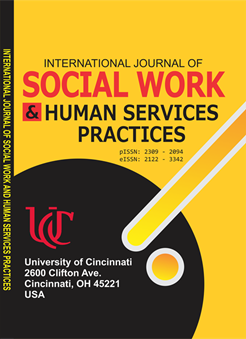INTERNATIONAL JOURNAL OF SOCIAL WORK AND HUMAN SERVICES PRACTICES (IJSWHSP)
CHALLENGES OF ADMINISTRATIVE OFFICERS IN THE IMPLEMENTATION OF EDUCATIONAL POLICIES IN PUBLIC JUNIOR SECONDARY SCHOOLS IN RIVERS STATE
E-ISSN: 2122-3342
P-ISSN: 2309-2094
DOI: https://iigdpublishers.com/article/336
This study investigated the challenges of administrative officers in the implementation of educational policies in public junior secondary schools in Rivers State. Three research questions and three null hypotheses were used for the study. A descriptive research design was adopted for this study. The population for the study consisted of all the principals and vice principals in the 379 male and female principals (235 and 144 respectively) from the three hundred and seventy-nine (379) public junior secondary schools in Rivers State. Sample size of 234 was used representing 61% of the total population of male and female principals from the 379 public junior secondary schools in Rivers State The stratified and simple random sampling technique was used for the study. The reliability of the
instrument was established using Pearson’s Product Moment Correlation (PPMC) and it yielded a reliability coefficient of 0.86. Data was analyzed using Mean and Standard Deviation to answer the research questions, while the null hypotheses were analyzed using t-test statistics. The findings of the study revealed that to a high extent that funding influences the hiring of qualified staff, maintaining of facilities, procuring of educational materials and the limited access of instructional resources for the implementation of educational policies in public junior secondary schools in Rivers State. The study also found out that to a high extent that classroom facility, office spaces, ICT facilities, school furniture and school building influences the implementation of educational policies in public junior secondary schools in Rivers State. Furthermore, the study found out that to a high extent that shortage of qualified teaching staff, lack of cooperation among teaching and non-teaching staff, Inadequate training and professional development opportunities for staff, and staff absenteeism and lateness influence the implementation of educational policies in public junior secondary schools in Rivers State. The study concluded that without substantial improvements in the areas of financial support, infrastructural development, and staff capacity, the successful implementation of educational policies will remain constrained. The study recommended that principals should provide opportunities for teachers to undergo regular on the job training and The Ministry of Education should prioritize the hiring of adequate support staff, including administrative assistants, clerical workers, and technical staff, to ensure that schools are better equipped to implement educational policies effectively.
Walson, Ominini Brother PhD & Ayesuwa Oluwatoyin
Adebayo, A. (2021). Infrastructure and educational outcomes: A review of public schools in Nigeria. International Journal of Educational Research, 33(2), 123-138.
Adebayo, A. (2021). Infrastructure challenges in Nigerian schools: A focus on public secondary education. International Journal of Educational Research, 32(3), 213-230.
Adebayo, A., & Eze, C. (2023). Professional development and teacher efficacy: Strategies for enhancing educational quality. Journal of Education and Practice, 14(6), 45-58.
Adebayo, T. (2021). The impact of infrastructure on educational outcomes in Nigerian secondary schools. Journal of Educational Development, 34(2), 104–118. https://doi.org/10.1016/j.jed.2021.08.002
Alhassan, A. (2020). The impact of funding on educational quality in Nigeria: An analysis of public junior secondary schools. Journal of Educational Management, 12(1), 45-58.
